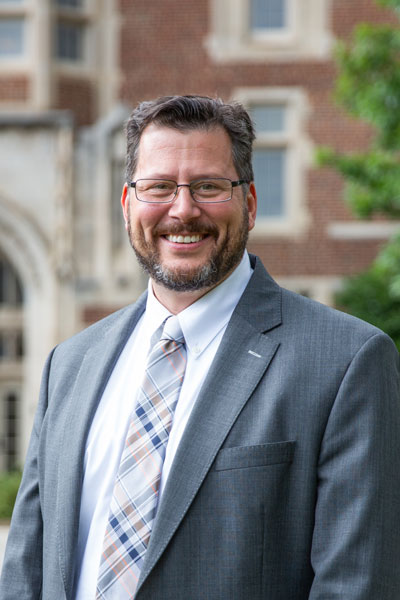
Matthew Mench
Wayne T. Davis Dean’s Chair
Chancellor’s Professor
Condra Chair
Contact:
456 Zeanah Engineering Complex
863 Neyland Drive
Knoxville, TN 37996-2346
Phone: 865-974-5321
Email: mmench@utk.edu
Education
- MBA, 2022, University of Tennessee, Martin
- PhD, 2000, The Pennsylvania State University
- MSME, 1996, The Pennsylvania State University
- BSME, 1994, The Pennsylvania State University
Biography
Matthew Mench received his BS, MS, and PhD in mechanical engineering from Pennsylvania State University in 1995, 1996, and 2000, respectively. After two years as a post-doctoral assistant and research professor, he was promoted to a tenure-track assistant professor of mechanical engineering at Penn State, where he founded the Fuel Cell Dynamics and Diagnostics Laboratory. He was promoted early with tenure to associate professor at Penn State in 2007. In August of 2010, Mench moved to the University of Tennessee, Knoxville (UT), as the Condra Chair of Excellence and professor of mechanical engineering, with a 25 percent joint appointment at Oak Ridge National Lab.
From August 2013 through November 2019, and from August 2020 through February 2021, he served as head of the Department of Mechanical, Aerospace, and Biomedical Engineering (MABE) with a 100 percent appointment at UT. Since July 1, 2021, he has served as dean of the Tickle College of Engineering.
During his time as department head, department research expenditures, enrollments, and donations all saw significant increases. From December 2019 through July 2020 he served as interim vice chancellor for research at UT, where he served on Chancellor Donde Plowman’s cabinet during the onset of the COVID-19 pandemic. In this role he oversaw conversion of the entire campus research enterprise to a scaled-down safe operations mode, and organized a team of experts to scale up an on-campus testing program that is still in use.
Mench has published more than 150 peer-reviewed publications with over 12,500 citations and an h-index of 56 according to Google Scholar. He is an inventor on seven issued patents, and has licensed technology and know-how to two start-up companies. He was named to the 2016 list of the 150 Most Cited Scholars in Energy Research by Elsevier Scopus Data. He was indicated as a top faculty in the “energy” category for research citations for both the past year and in career by a 2020 publication. He is a regularly invited speaker to industry, technical conferences, and top universities. He authored Fuel Cell Engines, now used as a textbook at universities around the world, with a second edition under contract from Wiley and Sons.
In 2014, Mench was selected by Thomson Reuters as a Highly Cited Researcher (HCR) in the category of engineering. This distinction was based on the greatest numbers of publications officially designated by Essential Science Indicators℠ as Highly Cited Papers—ranking among the top 1 percent most cited for their subject field and year of publication for the decade previous to selection in 2014.
Mench is an ASME fellow, and was elected by peers to serve on the Department Heads Executive Committee of ASME. He also previously served as the executive vice president of the International Association for Hydrogen Energy.
He is an associate editor emeritus for the International Journal of Hydrogen Energy and served as an associate editor for the ASME Journal of Electrochemical Energy Conversion and Storage. He was awarded a National Science Foundation Early Career Development Award in 2006, and was a recipient of the Penn State Engineering Society Outstanding and Premier Teaching Awards in 2006 and 2009, respectively.
Mench was awarded a UT Research Fellow Award in 2013, a UT Research Foundation (UTRF) Innovation Award in 2015, a Tickle College of Engineering Translational Research Award in 2016, and another UTRF Innovation Award in 2019.
In 2020 he was recognized as a Chancellor’s Professor, one of the highest distinctions at UT for a faculty member. His research interests span multi-phase transport phenomena, advanced diagnostics, sensors, and modeling of power conversion and storage systems. His work has been funded through a wide variety of industrial and government partners throughout his career.
Awards and Recognitions
- 2020 Chancellor’s Professor
- 2016 List of The 150 Most Cited Scholars in Energy Research by Elsevier Scopus Data
- UT College of Engineering Translational Research Award, 2016
- UT Research Foundation Start Up Award, 2016
- The World’s Most Influential Scientific Minds: 2014
- 2013 UTK College of Engineering Research Fellow Award
- Thomson Reuters Highly Cited Researchers (top 1% cited authors in engineering category for 2002-2012)
- Outstanding and Premier Teaching Awards, Penn State Engineering Society 2006 and 2009.
Professional Service
- ASME Fellow
- ASME Department Head Executive Committee
- Associate Editor of ASME Journal of Fuel Cell Science and Technology
- Former Executive Vice President, International Associate for Hydrogen Energy (IAHE)
- Associate Editor (Emeritus), International Journal of Hydrogen Energy
- Invited speaker to over 60 Universities, Research Laboratories, and Conferences
- Reviewer for Numerous Journals
- Conference Chair, 2008 Gordon Research Conference on Fuel Cells
- Advisory Board Member, Session Chair, or Organizer for Numerous Technical Conferences
- NSF Early Career Development (CAREER) Awardee 2007
- Fellow, American Society of Mechanical Engineers
- Member, Electrochemical Society
- NASA Graduate Research Fellowship (GSRP) 2000
Research
- Electrochemical power conversion and storage including polymer electrolyte fuel cells, flow battery systems, and biological energy systems.
- Multi-phase transport visualization and characterization.
- Computational simulation of electrochemical power conversion and storage systems.
- Electrochemical methods of hazardous waste conversion.
- Simulation of the influence of rapidly evolving socio-cultural factors on decision making and group opinion dynamics.